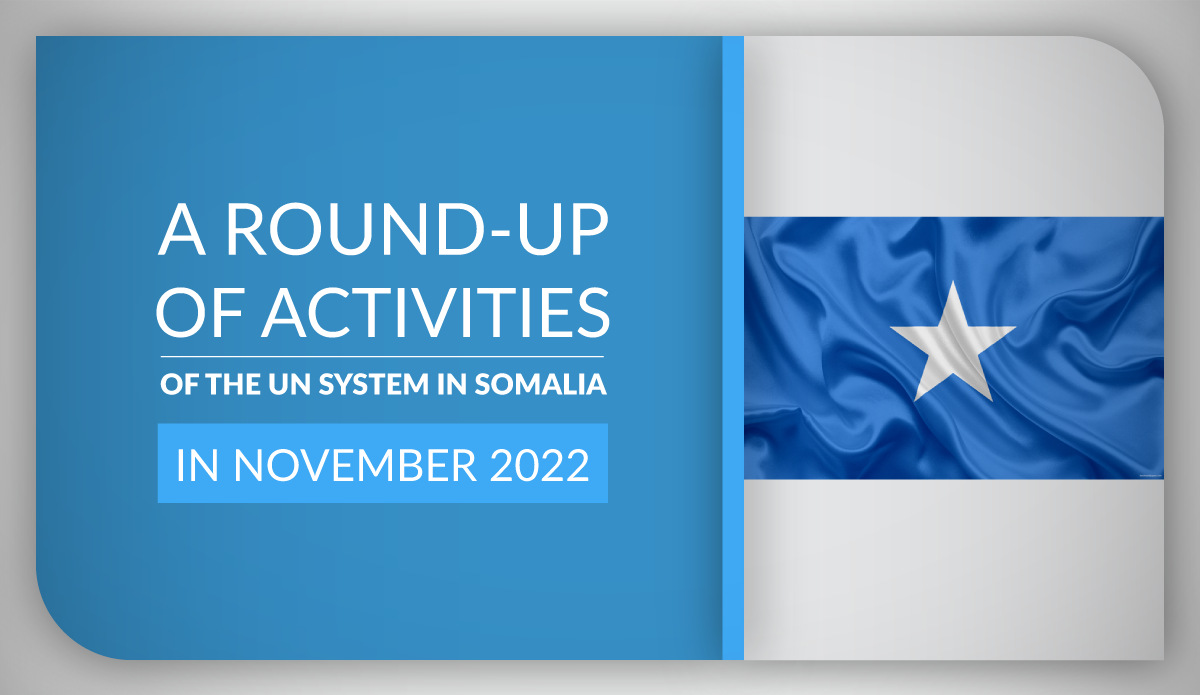A round-up of activities of the UN system in Somalia in November 2022
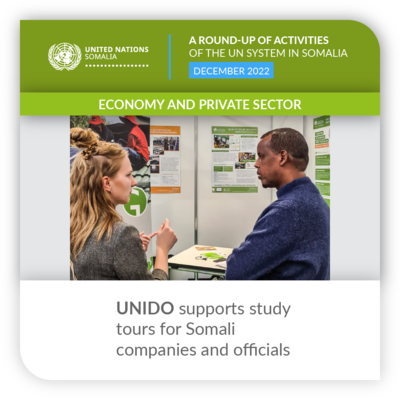 |
Desert Locusts | FAO's use of biopesticides helps win battle against desert locusts For decades, chemical pesticides have been the only solution to controlling desert locust numbers. But this approach can impact more than just these pests, it can also cause environmental and human health risks. During the 2019-2022 desert locust crisis, FAO, together with the Government of Somalia, used biopesticides and Insect Growth Regulators (IGRs) exclusively to control these pests, achieving a first in this kind of response and setting an example for locust management worldwide. The outstanding results achieved by the Somali authorities, with FAO’s support, are being analysed and shared between locust-affected countries. Since the crisis ended, FAO has organised several trainings and workshops with locust officers and ministry officials to improve locust management practices and share results. |
|
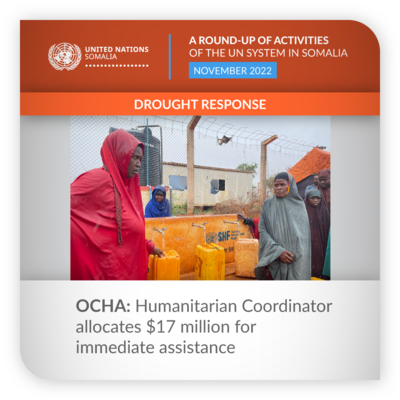 |
Drought | OCHA: Humanitarian Coordinator allocates $17 million for immediate assistance The Humanitarian Coordinator for Somalia allocated $17 million from the Somalia Humanitarian Fund for immediate assistance in areas at highest risk of famine, particularly in the worst-affected communities in Bay, Bakool and Mudug/Galmudug. In addition, OCHA is working with partners on the 2023 Humanitarian Needs Overview and the 2023 Humanitarian Response Plan for Somalia as it grapples with a severe drought which has led to severe water shortages, loss of livestock and soaring food prices. |
|
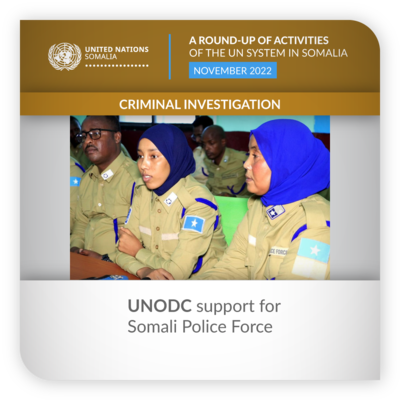 |
Criminal investigation | UNODC support for Somali Police Force November marked the completion of more than three years of UNODC support for the Somali Police Force (SPF) in strengthening its capacity to investigate serious and organized crime across Somalia. Thanks to the financial support of the US State Department’s Bureau of International Narcotics and Law Enforcement Affairs, UNODC has been supporting the police force through the UNODC Criminal Investigation Program (CIP) since 2019. Since the implementation of the programme more than 346 police officers and 102 administrative officers have been trained; this is in addition to support provided for more than 500 criminal investigation cases. Achievements also include establishing criminal investigation units in locations where they did not exist previously, such as in the Federal Member States of Hirshabelle, Galmudug and Jubaland, in addition to the Banadir region. |
|
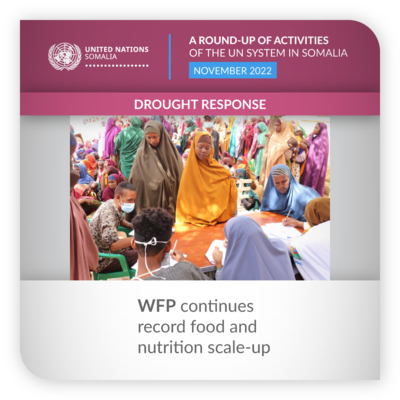 |
Drought | WPF continues record food and nutrition scale-up WFP continued to scale up its life-saving food and nutrition assistance at record levels in the ongoing race against time to avert projected famine in Somalia, amid the country's longest drought in over 40 years. From the start of November, WFP delivered life-saving food to more than 4.3 million people and nutrition support to over 550,000. In recent months, WFP has been reaching more Somalis with urgently-needed humanitarian relief than ever before. WFP has also been continuing to work with the government, UN humanitarian agencies and other partners to push further into the hunger hotspots where access remains a challenge - including areas of central Somalia where the threat of famine is most immediate. |
|
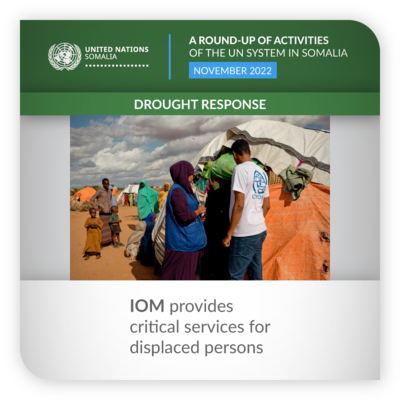 |
Drought | IOM provides critical services for displaced persons Somalia’s drought has forcibly displaced more than one million people since 2021, with most of the displaced heading to major cities and towns where they settle in informal sites and often face precarious living conditions. Displaced persons are often unaware of their rights and the services available for them at these sites. To address the information gap and ensure people receive adequate assistance, IOM is running camp management systems in nearly 628 displacement sites across the country that have received tens of thousands of people. The locations include Baidoa, Xudur, Doolow, Luuq, Baardhere, Kismayo, Mogadishu, Belet Weyne, Jalalaqsi, Bulo Burto and Jowhar. Camp managers identify each person and collect information on their background so that humanitarian partners understand the range of needs and the individual can get the needed support. Nearly 450,000 newly-displaced people have benefited from guidance and information through on-site staff since the start of 2022. |
|
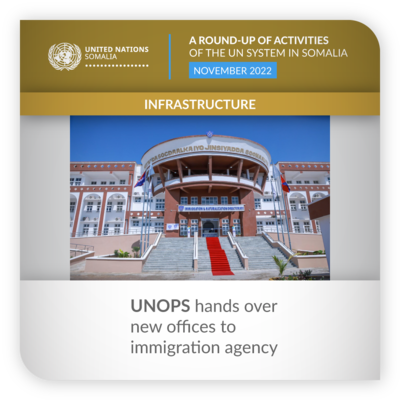 |
Infrastructure | UNOPS hands over new offices to immigration agency UNOPS handed over new offices to Somalia’s Immigration and Nationalization Directorate (IND). The offices will serve as the IND’s new headquarters and will help the entity’s efforts with immigration and border control as Somalia builds back after decades of strife. The new headquarters also incorporates green technology and integrated energy and water systems. The handover event was attended by various senior Somali and international partner representatives, including Prime Minister Hamze Abdi Barre, the country’s Federal Minister of Internal Security, the IND Director General, the Police Commissioner, and the Chief Justice of the Supreme Court, as well as officials from the Danish, Finnish Norwegian and United Kingdom governments. The new offices cost $6.8 million, with the funding coming from the UK’s Foreign, Commonwealth & Development Office, and the Ministries of Foreign Affairs of Denmark, Finland and Norway, with the latter also including its Ministry of Justice among the supporting entities. |
|
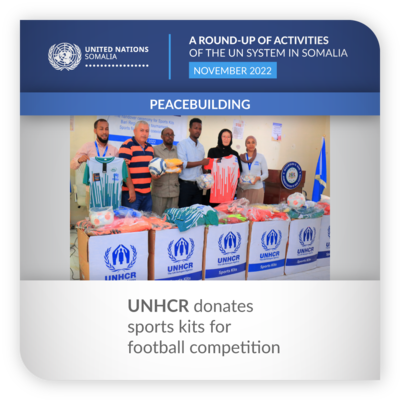 |
Peacebuilding | UNHCR donates sports kits for football competition In Bosaso, UNHCR donated sports kits to the Deputy Governor of the Bari region to facilitate the participation of eight teams – made up of internally displaced people, refugees and host communities – in a local football competition. The annual football competition aims at promoting integration and peaceful coexistence among youth in the Bari province of the northern Federal Member State of Puntland. The event was organized and supported through UNHCR's ‘Telling the Real Story’ project in Puntland, which promotes intra-community dialogue about the risks of trafficking and smuggling for people on the move. |
|
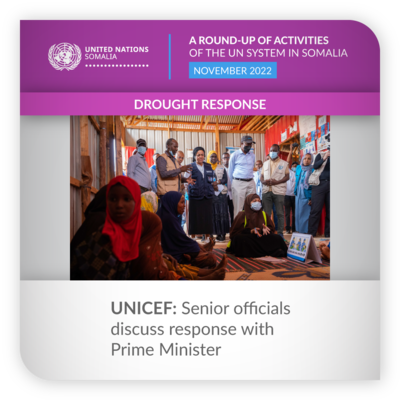 |
Drought response | UNICEF: Senior officials discuss response with Prime Minister UNICEF’s Deputy Executive Director, Omar Abdi, visited Somalia to see firsthand the impact of the drought. While in the country, accompanied by a counterpart from WFP, Mr. Abdi met Prime Minister Hamze Abdi Barre, and they discussed scale-up plans for the drought response as well as the need for long-term resilience and development support. Mr. Abdi also visited affected communities in Dollow, where he witnessed progress in the integrated response efforts, especially joint investments in resilience currently undertaken by UNICEF and other humanitarian UN agencies. According to UNICEF, in all interactions and forums, there was acknowledgment by UN partners of the progress made on the scale-up while acknowledging the scope for improvement in the quality of the response, the need for greater systematic and predictable support to partners on the front lines of the humanitarian crisis, improving integration in the response, and expanding the scale up to rural areas and recently recovered areas. |
|
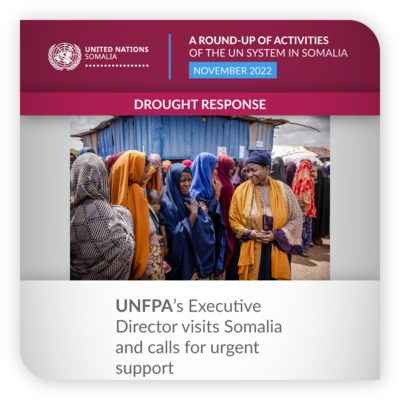 |
Drought response | UNFPA's Executive Director visits Somalia and calls for urgent support The Executive Director of UNFPA, Natalia Kanem, visited Somalia and called for urgent and increased support for women and girls affected by the worst drought to have hit the country in 40 years. In a media statement, Dr. Kanem also called on the international community to fund reproductive health and the prevention and response to gender-based violence as women and girls increasingly bear the brunt of the worsening drought. The drought plaguing Somalia has led to acute food insecurity and a surge in violence. UNFPA remains committed to safeguarding access to life-saving reproductive health and protection services that are critical for the survival and well-being of women and girls. |
|
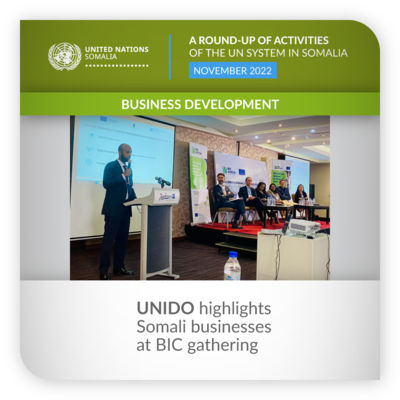 |
Business development | UNIDO highlights Somali businesses at BIC gathering UNIDO attended the First BIC (BIC) Africa Annual Gathering and Steering Committee in Addis Ababa. The event aimed to bring together selected business incubators of four target countries – Angola, Ethiopia, Madagascar and Somalia – to meet and develop relationships. UNIDO officials working in Somalia took part in the event’s panel discussions and gave a presentation on progress made by the country’s business sector. The gathering was hosted by BIC Africa, an initiative funded by the European Union and implemented by the European Business and Innovation Centre Network (EBN). |
|
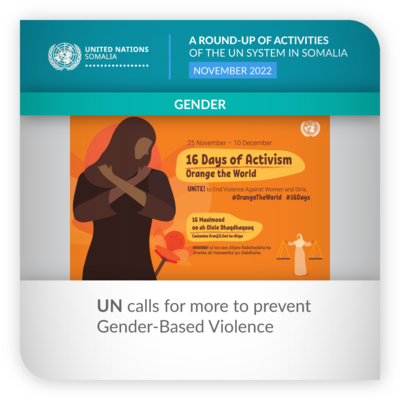 |
Gender | UN calls for more to prevent Gender-Based Violence At the start of this year’s global 16 Days of Activism against Gender-Based Violence, the United Nations in Somalia called for a redoubling of efforts to prevent and address violence against women and girls. “The ongoing humanitarian crisis and conflict in Somalia have displaced large populations and put women and girls at greater risk of violence, including sexual violence. Gender-based violence and conflict-related sexual violence severely impact on the right to life, livelihoods and dignity of women and girls,” said UNSOM’s Officer-in-Charge, the UN Secretary-General’s Deputy Special Representative for Somalia, Anita Kiki Gbeho. “Making humanitarian response more gender-inclusive and creating a safe environment for women and girls are critical,” she added. The annual 16 Days of Activism against Gender-Based Violence campaign, which runs from 25 November, the International Day for the Elimination of Violence against Women, to 10 December, Human Rights Day, is a reminder of the unfinished work to realize gender equality, peace, and security for all, in every sphere of life, including in public and political spheres. |
|
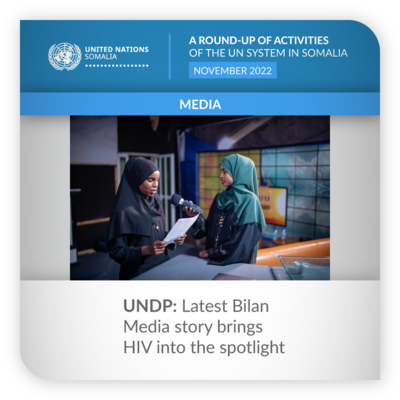 |
Media | UNDP: Latest Bilan Media story brings HIV into the spotlight Bilan Media, Somalia’s first all-women media team, broke new ground for Somali media by publishing the first in a series of stories looking at the lives of people living with HIV across the country. The story was broadcast on Dalsan TV and Radio and seen more than 220,000 times online in the first 24 hours. Spanish and English versions are being published in El Pais, one of several top-tier media (including the Guardian and the BBC) who are commissioning content from Bilan. The story has ignited a debate around how people living with HIV are treated, with most of the 2,000 comments online so far calling for greater support. This is the latest in a line of stories shining a light on social issues that are normally ignored. Other recent reports that have sparked public debate include features on child mothers and a rise in drug use among women in Mogadishu. |
|
|
|
||
|
|
 UN
UN
